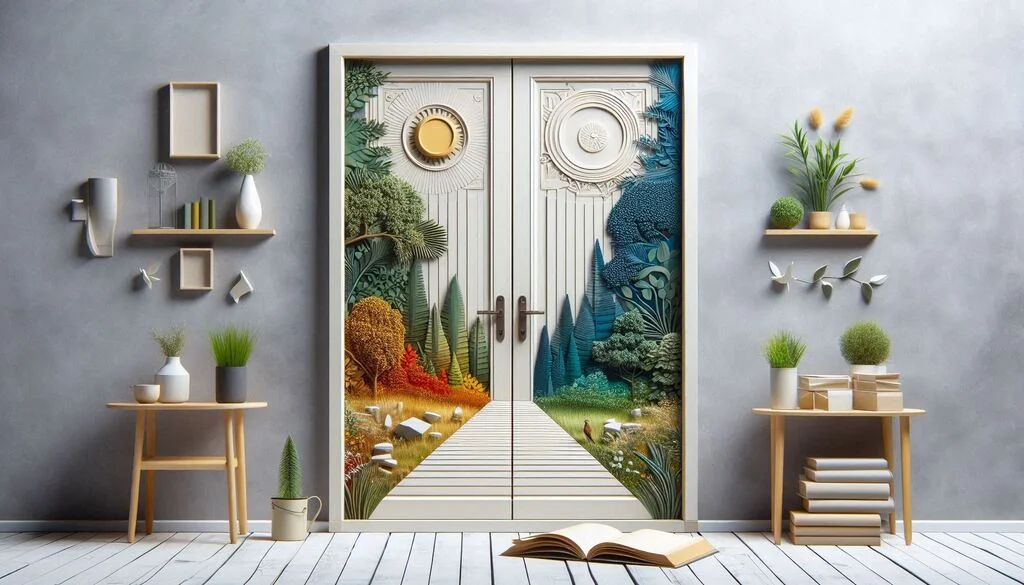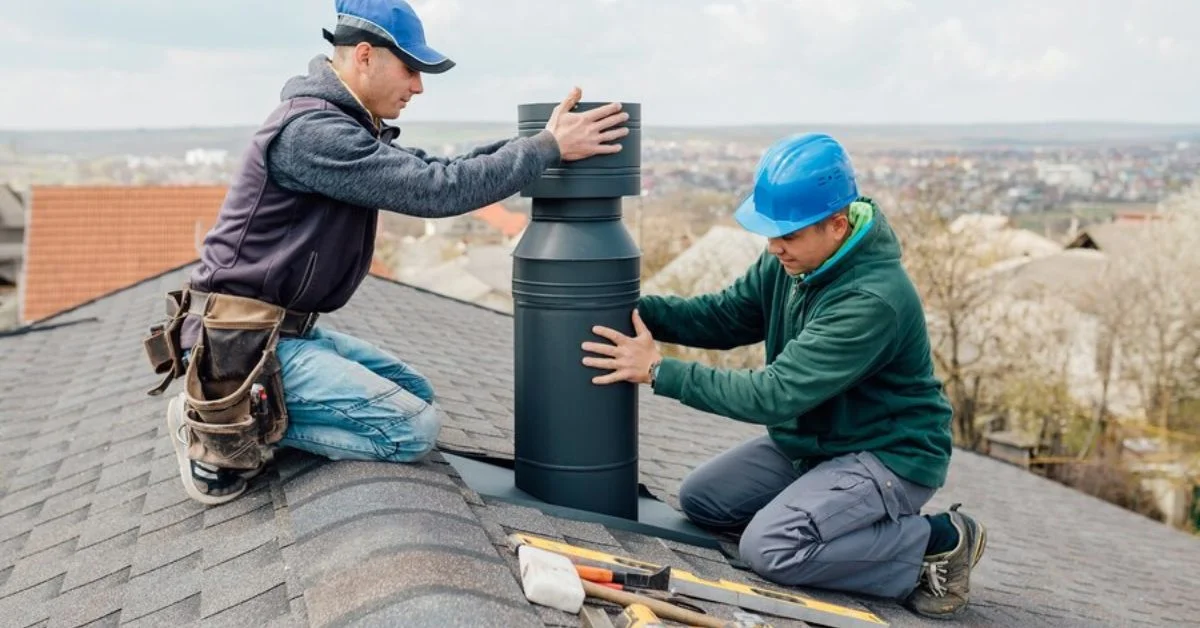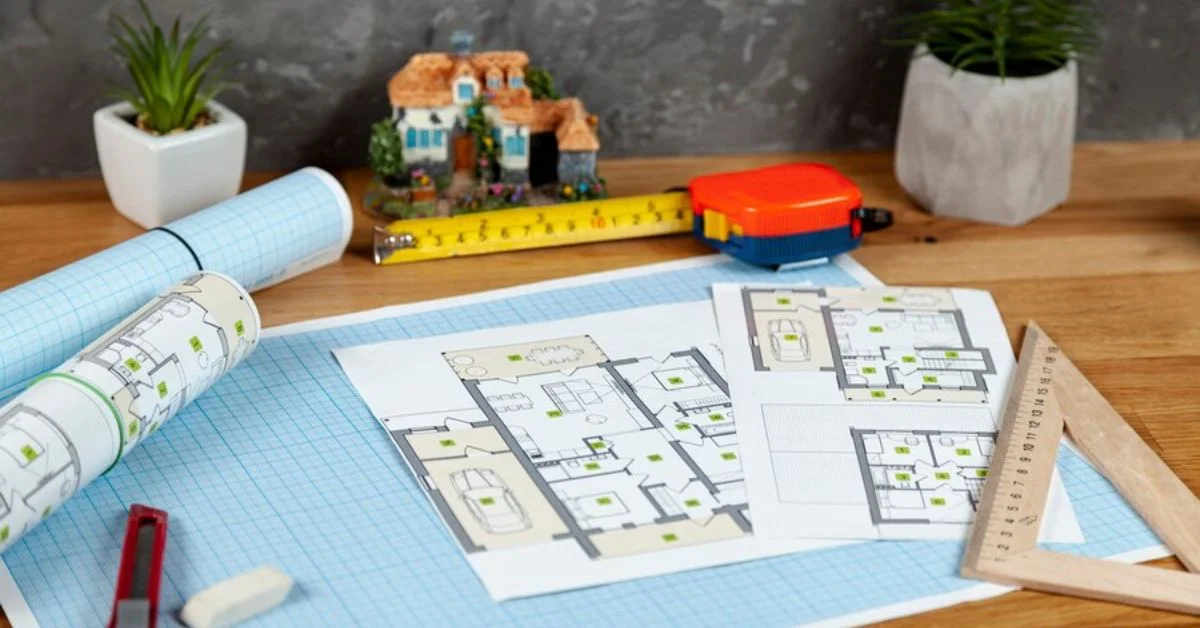HOME IMPROVEMENT
How Long Do Composite Doors Typically Last?

Composite doors have gained popularity over the years, known for their durability, energy efficiency, and aesthetic appeal. But one of the most common questions homeowners ask when considering a composite door is how long they can expect it to last. After all, investing in a door is no small decision, and knowing its lifespan can help you plan for the future. In this blog post, we will explore the factors that affect the lifespan of composite doors, the average lifespan you can expect, and ways to care for them to ensure they last as long as possible. Click here for more information.
Factors Affecting the Lifespan of Composite Doors
Climate and Weather Conditions
Composite doors are designed to withstand various weather conditions, but they’re not invincible. Extreme climates can cause wear over time, especially if the door is exposed to harsh sunlight, rain, or freezing temperatures. Prolonged exposure to UV rays can cause the door’s colour to fade, while excessive moisture can lead to swelling or warping. Additionally, doors in coastal areas may be exposed to saltwater, which can cause corrosion or deterioration of the door’s exterior over time.
Quality of Materials Used
The quality of the materials used in the construction of your composite door is one of the biggest determining factors in its lifespan. High-quality composite doors are made from top-tier materials that are more resistant to wear and tear. Lower-quality versions may not last as long, as they could be made from substandard components that degrade faster under pressure. When purchasing a composite door, ensure that you’re investing in a reputable brand that uses premium materials for long-term durability.
Frequency of Use and Location
Another factor influencing the lifespan of composite doors is how often they are used and where they are located. A door that is opened and closed multiple times a day, such as a front door, will experience more wear and tear than one that is used less frequently. Additionally, doors in high-traffic areas may be subject to more physical stress, which can cause parts like the hinges or locking mechanisms to wear out sooner.
Typical Lifespan of Composite Doors
Average Lifespan
One of the main reasons composite doors are so popular is their impressive lifespan. On average, you can expect a composite door to last anywhere from 30 to 35 years, depending on various factors like those mentioned earlier. This is significantly longer than traditional wooden doors, which may last only 15 to 20 years before requiring replacement. Compared to uPVC doors, which typically have a lifespan of around 20 to 25 years, composite doors are considered a more long-term investment.
Real-Life Examples
In many cases, composite doors have been known to last well beyond 30 years when properly cared for. Homeowners who have invested in high-quality composite doors often report satisfaction with their performance over decades, with minimal maintenance required. However, as with any product, the lifespan will be impacted by factors such as exposure to extreme weather or neglect in upkeep.
Maintenance and Care to Extend the Life of Composite Doors
Regular Cleaning
To maintain the appearance and functionality of your composite door, it’s essential to clean it regularly. Dirt and grime can build up over time, which may cause the surface to degrade or stain. Use a mild soap and water solution with a soft cloth to wipe down the door periodically. Avoid harsh chemicals, as they can damage the finish of the door.
Inspections for Wear and Tear
Regular inspections are vital to ensure that your composite door is functioning properly. Check the door’s seals for any signs of wear or damage, as compromised seals can affect the door’s insulation and security. It’s also important to inspect the hinges, handles, and locks for any issues. If you notice any problems, it’s best to address them promptly to prevent further damage.
Maintaining the Finish
Regular cleaning and inspections
The finish of your composite door can be vulnerable to the elements, particularly UV rays, which can cause fading or discolouration. If you notice that the colour is starting to fade, you can restore it by applying a suitable wood stain or protective coating. This will not only help preserve the appearance of the door but also provide an additional layer of protection against the weather.
Professional Maintenance vs. DIY Care
While most of the basic maintenance tasks can be handled by homeowners, there are instances where professional servicing is beneficial. A professional can inspect the door for structural issues, check the integrity of the locking mechanism, and ensure that the door is correctly aligned. They can also perform more advanced tasks, such as re-glazing or replacing seals, which might require specialized knowledge and tools.
Signs That Your Composite Door Needs Replacing
Visible Wear and Tear
Over time, even the most durable composite doors will show signs of wear. This can include cracks, chips, or fading of the door’s surface. While minor scratches can often be repaired, deep cracks or large areas of damage can affect the door’s structural integrity. If you notice significant wear that cannot be easily fixed, it may be worth considering a replacement.
Compromised Seals and Insulation
The seals around your composite door are essential for maintaining energy efficiency and keeping drafts at bay. If you notice a gap around the door where air can pass through, or if the door feels cold to the touch, the seals may have worn out. Damaged seals can cause heat loss and reduce your home’s insulation, resulting in higher energy bills. If replacing the seals doesn’t resolve the issue, the door may need to be replaced altogether.
Difficulty Opening or Closing
A composite door that becomes difficult to open or close can be a sign of misalignment or internal damage. If the door sticks, has trouble locking, or appears to be out of square, it can affect .the overall performance and security of the door. While some issues can be fixed by adjusting the hinges or locks, ongoing difficulties could mean it’s time for a new door.
In conclusion, composite doors typically offer a long lifespan, with most lasting between 30 to 50 years, depending on factors such as quality, maintenance, and exposure to the elements. Their durability, resistance to weathering, and minimal upkeep make them an excellent investment for homeowners looking for a long-term, low-maintenance solution. Regular care, such as cleaning and checking seals, can further extend their lifespan and keep them looking and functioning like new for years to come.
HOME IMPROVEMENT
Navigating the Market for Used Spray Rigs: A Comprehensive Guide

Used spray rigs can be an excellent investment for businesses looking to expand their capabilities in insulation, roofing, or specialty coatings without the hefty price tag of new equipment. We will explore everything from the benefits of opting for used equipment to the critical considerations one must make to ensure a wise purchase.
The Appeal of Used Spray Rigs
Opting for used spray rigs offers several attractive benefits. The most obvious is cost savings. Used rigs can be significantly cheaper than their new counterparts, making them an appealing option for startups or businesses looking to minimize capital expenditures. Additionally, the depreciation on used equipment is considerably less steep, which means it retains more of its value should you decide to sell it later. Purchasing used equipment also allows quicker acquisition since you typically bypass the manufacturing lead times associated with new equipment orders.
Evaluating the Condition of Used Spray Rigs
When considering a used spray rig, the most critical factor is the condition of the equipment. It’s essential to thoroughly inspect the rig, ideally with the help of a knowledgeable technician. Check for signs of wear and tear, potential damage, and the overall operational status of the machine. Assess the condition of key components like the spray guns, hoses, and the proportioner. Ensure the equipment has been well-maintained and inquire about any recent repairs or part replacements. A well-maintained used rig can offer reliability close to that of a new one at a fraction of the cost.
Where to Find Used Spray Rigs
Finding quality used spray rigs requires knowing where to look. One of the best places to start is specialty equipment resellers focusing on selling used construction and industrial machinery. These vendors often understand the equipment well and can provide a history of the rig’s usage and maintenance. Online marketplaces and auctions are another avenue, though they may require more diligence to ensure the equipment meets your standards. Networking with industry contacts can also lead to great deals on used spray rigs for sale.
Key Features to Check Before Purchase
Before purchasing a used spray rig, several key features require close inspection to ensure they meet the operational demands of your projects. The proportioner should function efficiently at the correct temperatures and pressures. Hoses should be free of cracks and leaks, while spray guns should deliver a consistent spray pattern. Check the electrical and mechanical systems to ensure they are in good working order, and pay attention to the rig’s trailer or chassis, which should be structurally sound and rust-free.
The Importance of a Reliable Seller
The reliability of the seller is crucial when purchasing used equipment. A reputable seller should provide transparent information about the rig’s history, including its age, usage, maintenance records, and any significant repairs. They should be willing to allow a thorough inspection of the rig and possibly even a demonstration to prove its functionality. Buying from established and respected sellers can decrease the likelihood of encountering issues with the equipment after purchase.
Potential Costs of Refurbishment
While purchasing a used spray rig can save money initially, it’s important to consider potential refurbishment costs. Depending on the rig’s condition, you might need to invest in repairs or upgrades soon after purchase. Factor in the costs of replacing hoses, repairing spray guns, or updating the proportioning system to ensure the rig meets your needs. Setting aside a budget for these potential expenses will help determine the cost of purchasing a used rig.
Warranty and Support Issues
Unlike new equipment, used spray rigs often have limited or no warranty. Any malfunctions or breakdowns will likely be your responsibility to fix, potentially adding to the overall cost of ownership. It’s important to discuss support options with the seller, whether they offer any guarantees or after-sale support, and if not, plan for how you will manage repairs and maintenance. Having a reliable service technician or a good relationship with a local equipment repair shop can mitigate some of these risks.
Financing Options for Used Spray Rigs
Financing used equipment can be more challenging than financing new equipment due to the increased risk perceived by lenders. However, many equipment financing companies offer loans or leases for used equipment purchases. These financing options can help spread the cost of the rig over time, making it more manageable. Shop for financing options to find terms that best suit your business’s cash flow and financial status.
Making the Decision: New vs. Used Spray Rigs
Deciding whether to invest in a new or used spray rig often comes down to comparing the immediate cost savings of used equipment against the long-term benefits of new. Consider factors such as the expected lifespan of the rig, potential downtime due to repairs, and the importance of technological advancements included in newer models. For some businesses, the latest technology and the peace of mind of a warranty are worth the extra investment. For others, the cost savings of a used rig align better with their financial strategy.
Investing in a used spray rig can be a smart financial decision for many businesses, offering significant savings and immediate availability. However, careful consideration of the rig’s condition, potential additional costs, and the seller’s reliability is required. By conducting thorough research and inspections, negotiating wisely, and preparing for additional maintenance investments, businesses can greatly benefit from the advantages of used spray rigs while minimizing the risks.
HOME IMPROVEMENT
Comprehensive Guide to Chimney Cap Maintenance and Repair

Chimney caps are vital in maintaining the safety and efficiency of your home’s heating system. These caps are designed to cover the top of your chimney flue. They prevent animals, debris, and water from entering the chimney, which can cause blockages or damage. Additionally, they help prevent sparks or embers from escaping the chimney and potentially starting a fire on your roof or nearby combustible materials. Regular maintenance of your chimney cap is crucial as it helps avoid costly repairs and extends the life of your chimney. For residents experiencing issues with their chimney caps, seeking professional chimney cap repair in Portland ensures that all repairs are conducted with high standards and quality materials.
Identifying Common Issues with Chimney Caps
Common issues with chimney caps include rusting, corrosion, and physical damage such as dents or dislodgement. Rust and corrosion can occur due to exposure to the elements, especially in areas with high humidity or coastal regions where salt is present. Physical damage can occur from severe weather conditions such as high winds or heavy snowfall. It’s also common for chimney caps to become loose over time, which can compromise their functionality. Regular inspections can help identify these issues early, preventing further damage to your chimney system.
Materials Used in Chimney Caps: Pros and Cons
Chimney caps are typically made from metals like galvanized steel, stainless steel, or copper. Galvanized steel is cost-effective but prone to rust over time, diminishing its durability. Stainless steel offers better resistance to rust and corrosion, making it a more reliable choice for chimney caps, although it is more expensive. Copper is the most durable and aesthetically pleasing option, but it comes at a higher cost and requires regular polishing to maintain its shiny appearance. Choosing the right material depends on your budget, the climate of your area, and how often you are willing to perform maintenance.
Step-by-Step Guide to Inspecting a Chimney Cap
Inspecting your chimney cap is a straightforward process that you can do yourself or with the help of a professional. Begin by visually examining the cap from the ground to see if there are any obvious signs of damage or wear. Use binoculars if necessary. If it looks intact, use a ladder to get a closer view. Check for rust and corrosion, and ensure the cap is securely attached to the flue. Look inside the flue to see if any blockage is visible from the top. If you are uncomfortable performing this inspection independently, consider hiring a professional to ensure it is done safely.
Tools and Materials Needed for DIY Chimney Cap Repair
For DIY chimney cap repair, you will need basic tools and materials, including a hammer, pliers, wire brush, and appropriate sealants or paints, depending on the material of your cap. For example, if you have a galvanized steel cap, you might need rust-inhibiting paint to treat areas where rust has formed. Stainless steel caps only require cleaning and tightening, whereas copper caps need polishing and lacquering to restore appearance. Always ensure you have the correct safety gear, such as gloves, goggles, and a sturdy ladder.
Professional Repair Services: When to Call in the Pros
While many aspects of chimney cap maintenance can be handled on a DIY basis, there are times when it’s advisable to call in professionals. This is particularly true if the damage to your chimney cap is extensive or if the cap requires complete replacement. Professionals can also help in cases where the chimney has been damaged or if there are signs of blockage you cannot clear yourself. Hiring a professional can ensure that all parts of your chimney system are in optimal working condition and safe to use.
Long-Term Maintenance Strategies for Chimney Caps
Implement a routine maintenance schedule to ensure the longevity and effectiveness of your chimney cap. This includes regular inspections and immediate repairs of any small issues before they become major problems. Consider treating metal chimney caps with rust inhibitors or applying waterproof sealants to prevent water damage. It is also advisable to clean your chimney and cap annually to remove soot, debris, and creosote buildup, which can affect the performance of your heating system and pose a fire hazard.
The Role of Chimney Caps in Home Safety
Ultimately, chimney caps play a crucial role in maintaining your home’s safety. They prevent the ingress of rainwater, which can lead to structural damage and mold growth within your chimney. They also block animals from nesting in the chimney, which can cause blockages and hazardous conditions. Chimney caps reduce the fire risk by keeping embers contained, protecting your home and its occupants. Regular maintenance and prompt repair of your chimney cap are essential to ensure your home remains safe and your heating system operates efficiently throughout the year.
HOME IMPROVEMENT
Designing Functional Spaces: Exploring Carriage House Floor Plans

Carriage house floor plans are detailed blueprints that outline the layout and design of carriage houses, versatile structures that serve various purposes such as garages, guesthouses, studios, or rental units. These floor plans provide essential guidance for architects, builders, and homeowners to visualize and execute the construction of carriage houses according to specific needs and preferences. Homeowners can maximize their creativity and find the perfect layout by taking the time to explore different carriage house floor plans.
Types of Carriage House Floor Plans
Several types of carriage house floor plans are available, each catering to different requirements and lifestyles. Traditional floor plans typically feature a two-story design, with a garage on the ground floor and living quarters or storage space above. Modern floor plans may include single-story or multi-level layouts with open-concept living spaces, gourmet kitchens, and luxurious amenities. Additionally, some floor plans incorporate additional features such as balconies, decks, or rooftop gardens to maximize outdoor living space.
Layout and Space Utilization
A carriage house floor plan layout is crucial for maximizing space utilization and functionality. Efficient floor plans prioritize open flow between rooms, with designated living, dining, cooking, and sleeping areas. Ample storage space, including closets, cabinets, and built-in shelving, helps minimize clutter and maintain organization. Flexibility in design allows for customization according to individual needs, whether creating a home office, a fitness area, or a rental unit for supplemental income.
Architectural Styles and Aesthetic Appeal
Carriage house floor plans come in various architectural styles, from traditional to contemporary, to suit different tastes and preferences. Classic styles may feature elements such as pitched roofs, dormer windows, and decorative trim, evoking a sense of nostalgia and charm. On the other hand, modern styles may incorporate clean lines, minimalist design, and sleek finishes for a more contemporary look and feel. By selecting the right architectural style, homeowners can enhance their carriage house’s aesthetic appeal and overall ambiance.
Integration with Main Residence
Carriage house floor plans are often designed to complement the architecture and style of the main residence, creating a cohesive and harmonious aesthetic. Integration with the main residence may involve matching exterior finishes, coordinating rooflines, and maintaining consistent architectural details. Additionally, the thoughtful placement of the carriage house on the property ensures privacy and visual harmony while maximizing views and natural light. Whether attached or detached, the carriage house should feel like a seamless extension of the main residence, enhancing the property’s overall value and curb appeal.
Accessibility and Universal Design
Accessibility is an essential consideration in carriage house floor plans, ensuring that the space is usable and enjoyable for people of all ages and abilities. Universal design principles may include wider doorways, zero-step entries, lever door handles, and accessible bathrooms with grab bars and roll-in showers. These design elements promote safety, convenience, and independence for homeowners and guests, regardless of mobility limitations. By incorporating universal design principles into carriage house floor plans, homeowners can create inclusive and welcoming spaces that accommodate diverse needs and lifestyles.
Energy Efficiency and Sustainable Design
Carriage house floor plans can incorporate energy-efficient and sustainable design principles to minimize environmental impact and reduce utility costs. This may include high-performance insulation, energy-efficient windows and doors, passive solar design, and renewable energy systems like solar panels or geothermal heating. By optimizing energy efficiency, carriage houses can operate more sustainably and affordably, benefiting both the environment and homeowners’ wallets. Sustainable materials and construction practices also contribute to healthier indoor air quality and long-term durability, ensuring that the carriage house remains a comfortable and environmentally responsible living space for years.
Outdoor Living Spaces and Landscaping
Carriage house floor plans often include outdoor living spaces and landscaping features to enhance the overall functionality and enjoyment of the property. This may include patios, decks, or courtyard gardens for outdoor entertaining, relaxation, and recreation. Thoughtful landscaping with native plants, trees, and shrubs enhances curb appeal and promotes biodiversity, water conservation, and ecological resilience. Homeowners can create inviting and sustainable environments that blur the line between indoor and outdoor living by integrating outdoor living spaces and landscaping into carriage house floor plans.
Carriage house floor plans offer homeowners a flexible and customizable solution for creating additional space on their property. By exploring different types of floor plans, considering layout and space utilization, selecting architectural styles, integrating with the main residence, prioritizing accessibility and universal design, promoting energy efficiency and sustainable design, and incorporating outdoor living spaces and landscaping, homeowners can design carriage houses that meet their unique needs and preferences. With careful planning, attention to detail, and collaboration with architects and builders, carriage house floor plans can transform visions into reality, creating functional, beautiful, and harmonious spaces that enhance the overall value and enjoyment of the property.

 BUSINESS1 year ago
BUSINESS1 year agoExploring the Benefits of Commercial Printing

 HOME IMPROVEMENT12 months ago
HOME IMPROVEMENT12 months agoThe Do’s and Don’ts of Renting Rubbish Bins for Your Next Renovation

 BUSINESS12 months ago
BUSINESS12 months agoBrand Visibility with Imprint Now and Custom Poly Mailers

 HEALTH8 months ago
HEALTH8 months agoThe Surprising Benefits of Weight Loss Peptides You Need to Know

 TECHNOLOGY10 months ago
TECHNOLOGY10 months agoDizipal 608: The Tech Revolution Redefined

 HEALTH8 months ago
HEALTH8 months agoYour Guide to Shedding Pounds in the Digital Age

 HOME IMPROVEMENT8 months ago
HOME IMPROVEMENT8 months agoGet Your Grout to Gleam With These Easy-To-Follow Tips

 HEALTH11 months ago
HEALTH11 months agoHappy Hippo Kratom Reviews: Read Before You Buy!












